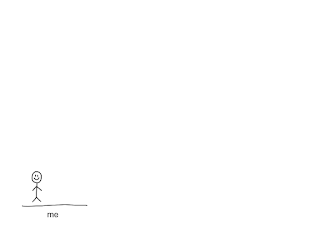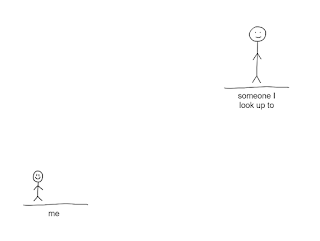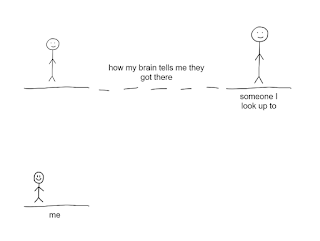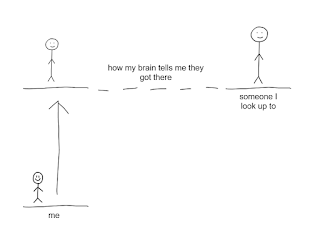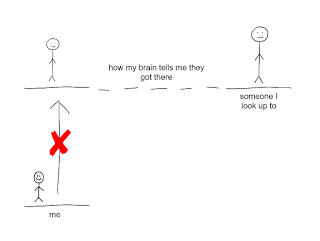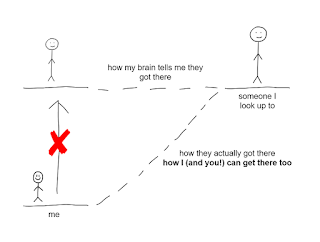Your Research. Your Life. Your Story.
A magnetic community of researchers bound by their stories
Every researcher has a story. What’s yours?
Academic career barriers: Dismantling the brick wall of self-doubt

When you look ahead on your career path, do you see nothing but open road to be traveled, or is there a big brick wall in your way that feels insurmountable? Do you feel like you’re skipping along, or like you’re struggling to make any progress because of the heavy weight you’re dragging? Do you even know what path you want to be on, or are you still working to discover what direction you want to travel?
If you are facing down a wall, dragging a weight, or still finding your direction, you are not alone. I’ve been there, and in many ways, am still there. Same for most of the people around you, even if they don’t show it. And, this series is for you. While there are some common themes among career barriers, no two people face the same challenge, and there are no universal answers. So, this series of posts will highlight stories from a diverse group of people who have dealt with a wide variety of career barriers and can each offer a unique perspective and advice. Hopefully some of these stories will resonate with what you’re facing, and maybe some will help you to understand and encourage someone around you.
My biggest career barrier is one I alternately faced down, wrestled with, and ran from for 10 straight years. As I entered my senior year of college, I had been working as an undergraduate researcher for two years and was applying to graduate schools. When people would ask me about my career goals, I would lie and say “I don’t know.” It’s perfectly okay (and quite normal!) to not know what you want to do at that point, but that wasn’t my story. I knew exactly what I wanted to do. I desperately wanted to be a professor at a major research university, but I couldn’t bring myself to say this because I was convinced that my goal was completely unattainable. I looked around at the professors at my institution, and was convinced that because I was not as smart or creative as them, I could never do their job.
Fortunately, I stayed on the path, went to graduate school, and pushed myself hard to accomplish as much as I could. I was able to do this because I just love research that much. But, the whole time, I struggled with the notion that I was working toward an end goal that was impossible. I had wonderful and supportive research advisors, but I was afraid to admit my goals and corresponding self-doubt to them. As I was preparing to leave for my postdoc, I finally broke down and admitted my struggle to my PhD advisor. That turned into one of the most impactful conversations of my career. It went like this:
Me: I so desperately want a career in academia, but I look at what you do, and I just can’t do that.
Advisor: Of course you can’t…
Me: ?!?
Advisor: …not now, but you’ll get there.
My advisor then went on to explain how as a graduate student, he could not have done all of the things that are required of a faculty member, and that even as an assistant professor, he could not do what he could as a full professor. But, careers are all about growth. And, if you are willing to push yourself and grow a little bit each day, by the time you get to each stage, you will have the skills and knowledge you need to be successful there.
When my advisor said this, it struck me that I had been experiencing this phenomenon for many years without even realizing it. I thought back to how little I knew as an undergraduate researcher and how many mistakes I made, and compared that to what I could do after earning my PhD. As an undergrad, I struggled to write even a short honors thesis and present that to my class of 15 fellow students, but by the end of my PhD, I felt confident drafting manuscripts for peer-reviewed journals and presenting at conferences. As an undergrad, I struggled to even grasp the concepts behind my project, but by the end of my PhD, I was designing entirely new projects. As an undergraduate student, I had looked at the senior graduate students and thought to myself “I could never do what they do,” and here I was doing exactly that!
This realization was the first step in starting to dismantle the brick wall of self-doubt that had been blocking my career path for so many years. I still faced a consistent struggle with whether I could be successful as a professor, but for the first time in my career, I had some hope that I might be able to get there.
I’m now in that job that I dreamed about for so long. And, as I’ve continued to unpack this wisdom over the course of my career, I’ve realized that much of the struggle boils down to a very cruel fallacy that our brains can sneak into our thought process. I’ve sketched this out below.
Here’s me – I’m kind of a small and pretty smiley:
Here’s someone I look up to (x-axis = career stage; y-axis = capability):
Now this is the cruel trick my brain plays on me. This is where I envision that they were in ability at my current career stage and how they got to where they are now:
So, if I want to eventually get to where they are, I need to wake up tomorrow with that same level of ability:
I know just enough physical chemistry to be dangerous, so I know that this is a “disallowed transition”:
This is where I was stuck for so many years. If I couldn’t instantly get myself to the knowledge and skill level of my mentors, then I could never get to being a professor. But, of course, there is another option:
At this point in my career, I can look back over the past 20 years since I started as an undergraduate researcher and clearly see the consistent growth that has brought me to where I am now. Yet, I still catch myself looking at people who are ahead of me on the career path and thinking, “I could never do what they do.” Yeah, my brain is my best friend and my worst enemy. But, at least now I have the logic I need to coach myself through these moments and realize that if I set a goal and consistently work toward it, there is a very good chance I’ll eventually get there, or I’ll at least grow a ton from where I was.
Jennifer M. Heemstra is an Associate Professor of Chemistry at Emory University. This story was published on November 15, 2018, on Jennifer's blog Things that change the way I think (available here) and has been republished here with her permission.
Comments
You're looking to give wings to your academic career and publication journey. We like that!
Why don't we give you complete access! Create a free account and get unlimited access to all resources & a vibrant researcher community.

Your Research. Your Life. Your Story.
A magnetic community of researchers bound by their stories




